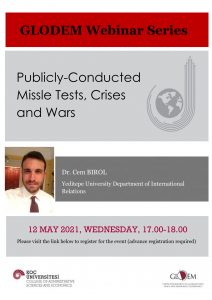Publicly-Conducted Missile Tests, Crises and Wars
Mayıs 7, 2021Center for Research on Globalization, Peace and Democratic Governance (GLODEM) based at Koç University, pursues to engage with academic research on globalization, regionalization, peace, public administration and politics and governance. GLODEM Virtual Seminar Series, initiated to discuss and analyze selected current topics from an academic perspective with the experts of the issues, now continues its 7th session with the title of “Publicly-Conducted Missile Tests, Crises and Wars”. The event will be moderated by Caner Bakır with the participation of Cem Birol on May 12, 2021 Wednesday at 5 pm.
GLODEM invites you to the Webinar Series.
Date: May 12, 2021
Time: 17.00-18.00.
Speaker: Cem Birol, Yeditepe University
Moderator: Caner Bakır, Koç University
Zoom registration link: (advance registration required)
https://kocun.zoom.us/webinar/register/WN_ht7j_qaiSJ2qaKdFNR9HGQ
Title: Publicly-Conducted Missile Tests, Crises and Wars
Summary: Countries like China, North Korea, Pakistan, India, Russia, and Iran frequently test-launch missiles in public. Many experts are concerned with these tests for the sake of global security. Surprisingly, until now, no scientific studies explored whether a country’s more frequent displays of its missile tests increase the risk of its interstate crises and wars involvement. In this paper, I present an answer to this question by empirically investigating two different theories. The first is R. Jervis’ Spiral Theory according to which more frequent public missile tests leads to insurmountable security problems among nations. The result of this security deficit is more frequent international crises, and wars. The second is the coercive diplomacy argument which anticipates that public missile tests increase the risk of crisis onset but decrease the probability that these crises escalate to wars. To test these empirical expectations, I use a sample consisting of 11 countries’ publicly-conducted missile tests. The results of the Heckman Probit analyses suggest that when these countries increase their quarterly number of public missile tests, they are more likely to enter international crises. However, given that they enter these crises, they are also less likely to take escalatory steps – which lends support for the coercive diplomacy hypothesis. In order to illustrate my findings, I then overview the recent US-North Korea diplomatic history. I show that North Korea increases its public missile tests subsequent to diplomatic gridlocks and until a new crisis occurs with the US.
Biography: Cem Birol received his MA in International Relations from Koc University in 2012. He wrote his thesis on anti-Americanism under the supervision of Prof. Michael Mousseau. He then moved to the United States and received his PhD in Political Science at Rice University. He worked with Prof. T. Clifton Morgan on the Threat and Imposition of Economic Sanctions (TIES) project and presented articles in international conferences. For his dissertation, he collected and analyzed a dataset on publicly-conducted missile tests. His statistical analyses shed light on policy-relevant security issues such as North Korean, Iranian, Chinese, or Pakistani missile tests. After the completion of his doctoral degree, Birol worked at Baker Institute’s Center for Middle East where he published his own research. In May 2020, he returned to Türkiye due to COVID-related complications. In 2021, he started his academic career as a lecturer at Yeditepe University and submitted several articles for publication on his main area of expertise: missile tests and international security. Birol also refereed for several academic journals including Journal of Defense and Peace Economics and Foreign Policy analysis. For more, see https://cembirol.com/research/
The event will be held in English via Zoom.
Please visit the link below to register for the event.
https://kocun.zoom.us/webinar/register/WN_ht7j_qaiSJ2qaKdFNR9HGQ
